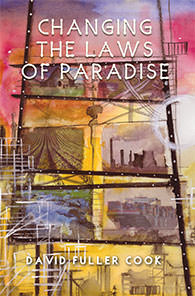Changing the Laws of Paradise
by David Cook
Publishing Date 2018
First Chapter
My name is Olivia Byrd. My brother is Wayman Byrd. This history is about him. Mom could never admit to Wayman being violent, but I knew he was. He told me the cause, how he felt born here against his will, as if assigned and relocated, and forced to watch the twenty-first century industrial assault on the planet, his soul turned to steel and every nerve of his body stripped to wire. My brother could as likely have been one of those five guys in Ohio who took C-4 explosives and tried to blow up a bridge connecting two gated Cleveland subdivisions in the middle of the night as document to the decline of New World warblers in the Central American rain forests. I love my brother, however much he is (was) a strangled mix of dreams and anger. Mom never stopped believing Wayman was going to find himself, establish his own identity, as many young people do. Of course she held out hope for our brother Simeon too. I suppose that’s what mothers do. Mom always wanted the best for us, and the world wouldn’t need saving if Mom had had anything to do with it. I think she thought Wayman was going to grow up and be a vet or something. In high school Wayman took one of those tests that tells you what career would best suit you and decided he would become a park ranger, but he never did because he found out you had to take biology and cut up frogs and dead pigs. The summer of his sophomore year in college Wayman worked an internship at a bird observatory in New England and spent a Christmas in Belize in a field study program, renewing Mom’s hopes he would become a scientist and enabling Mom to ignore the rant he became more comfortable with: Wayman was Wayman. To her, he was just blowing off steam about a quarter of the earth’s mammals’ extinction in thirty years; the disappearance of coral reefs and climate change; acidifying and rising oceans; overfishing, sedimentation, planet-wide pollution, and the outbreak of anxiety in society, which Wayman based on science similar to the explanation that the increase of tornadoes and wildfires correlated with rising global temperatures and C02 levels. And she didn’t understand that I was listening. Several weeks before he disappeared Wayman wrote a letter telling me that he had found his purpose. He had reconnected with Esther, a girl he had known in high school and met a man named Levi. He didn’t mention NEST or the Wonderland Project, just Esther and Levi—and more about jobs shipped overseas; cities contaminated with abandoned brown fields; energy and water transfers, industrial food production, genetically modified foods, the broad-sell of the global marketplace and the loss of species. And cell phone towers. Wayman’s big thing was cell phone towers, seven million birds killed in the United States every year by cell phone towers when Wayman was in high school, and in ten years the number of cell phone towers had gone from a hundred thousand to over three hundred thousand. I didn’t see the true purpose in the letter. I suppose I was afraid Wayman had taken on the pain of the world and was at risk of committing suicide. People do. Unconsciously, wanting to think he had something to live for, or starved to believe I was important to my brother, I created my own story. I chose to believe Wayman had found, not a purpose, but a lover. And so, even in the presence of that letter full of rant—oil exploration in Ecuador, toxic spills, deforestation; commodity soybean and cattle production leading to climate change conducted by faceless corporations—I didn’t read between the lines what Wayman was really saying about Levi, the prime mover to a band of free radicals to become a new constellation in my life, or have the least suspicion of how his hand of influence would change the course of all our lives.

 OUT OF STOCK
OUT OF STOCK